Insulin: A Primer
Insulin is a hormone that regulates the levels of sugar in your blood. When you eat a meal, the carbohydrate in the meal is broken down into glucose (a sugar used as energy by your cells). The glucose enters your blood. Your pancreas senses the rising glucose and releases insulin. Insulin allows the glucose to enter your liver, muscle, and fat cells. Once your blood glucose starts to come back down, insulin levels come back down too. This cycle happens throughout the day. You eat a meal, glucose goes up, insulin goes up, glucose goes down, and insulin goes down. Insulin levels are typically lowest in the early morning since it's usually been at least 8 hours after your last meal.
Insulin doesn't just regulate blood sugar. It has other effects as well. For example, it stimulates your muscles to build new protein (a process called protein synthesis). It also inhibits lipolysis (the breakdown of fat) and stimulates lipogenesis (the creation of fat).
It is the latter effect by which insulin has gotten its bad reputation. Because carbohydrate stimulates your body to release insulin, it has caused some people to argue that a diet high in carbohydrate will cause you to gain fat. Their reasoning, in a nutshell, goes like this:
High Carbohydrate Diet -> High Insulin -> Increased Lipogenesis/Decreased Lipolysis -> Increased Body Fat -> Obesity
Using this same logic, they argue that a low carbohydrate diet is best for fat loss, because insulin levels are kept low. Their logic chain goes something like this:
Low Carbohydrate Diet -> Low Insulin -> Decreased Lipogenesis/Increased Lipolysis -> Decreased Body Fat
However, this logic is based on many myths. Let's look at many of the myths surrounding insulin.
MYTH:A High Carbohydrate Diet Leads to Chronically High Insulin Levels
FACT:Insulin Is Only Elevated During the Time After a Meal In Healthy Individuals
One misconception regarding a high carbohydrate intake is that it will lead to chronically high insulin levels, meaning you will gain fat because lipogenesis will constantly exceed lipolysis (remember that fat gain can only occur if the rate of lipogenesis exceeds the rate of lipolysis). However, in healthy people, insulin only goes up in response to meals. This means that lipogenesis will only exceed lipolysis during the hours after a meal (known as the postprandial period). During times when you are fasting (such as extended times between meals, or when you are asleep), lipolysis will exceed lipogenesis (meaning you are burning fat). Over a 24-hour period, it will all balance out (assuming your are not consuming more calories than you are expending), meaning you do not gain weight. Here's a graph showing how this works:
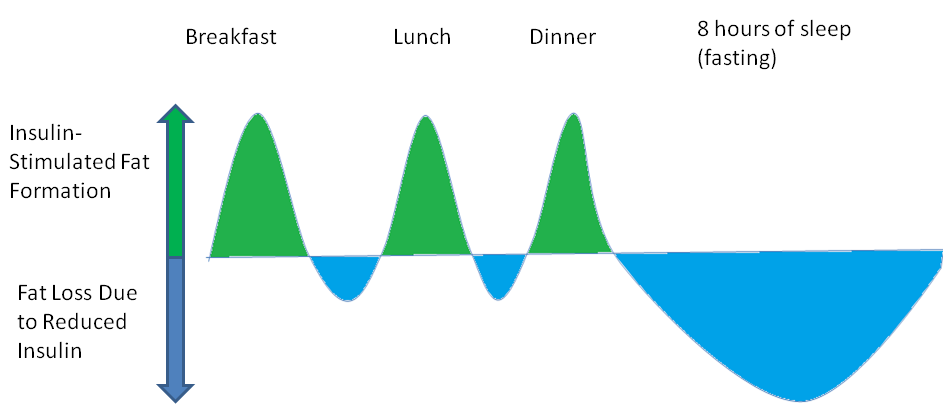
After meals, fat is deposited with the help of insulin. However, between meals and during sleep, fat is lost. Fat balance will be zero over a 24-hour period if energy intake matches energy expenditure.
This is just a rough chart that I made, but the green area represents the lipogenesis occuring in response to a meal. The blue area represents lipolysis occuring in response to fasting between meals and during sleep. Over a 24-hour period, these will be balanced assuming you are not consuming more calories than you expend. This is true even if carbohydrate intake is high. In fact, there are populations that consume high carbohydrate diets and do not have high obesity rates, such as the traditional diet of the Okinawans. Also, if energy intake is lower than energy expenditure, a high carbohydrate diet will result in weight loss just as any other diet.
MYTH: Carbohydrate Drives Insulin, Which Drives Fat Storage
FACT: Your Body Can Synthesize and Store Fat Even When Insulin Is Low
One of the biggest misconceptions regarding insulin is that it's needed for fat storage. It isn't. Your body has ways to store and retain fat even when insulin is low. For example, there is an enzyme in your fat cells called hormone-sensitive lipase (HSL). HSL helps break down fat. Insulin suppresses the activity of HSL, and thus suppresses the breakdown of fat. This has caused people to point fingers at carbohydrate for causing fat gain.
However, fat will also suppress HSL even when insulin levels are low. This means you will be unable to lose fat even when carbohydrate intake is low, if you are overeating on calories. If you ate no carbohydrate but 5,000 calories of fat, you would still be unable to lose fat even though insulin would not be elevated. This would be because the high fat intake would suppress HSL. This also means that, if you're on a low carbohydrate diet, you still need to eat less calories than you expend to lose weight.
Now, some people might say, "Just try and consume 5000 calories of olive oil and see how far you get." Well, 5000 calories of olive oil isn't very palatable so of course I won't get very far. I wouldn't get very far consuming 5,000 calories of pure table sugar either.
MYTH: Insulin Makes You Hungry
FACT: Insulin Suppresses Appetite
It is a well known fact that insulin acutely suppresses appetite. This has been demonstrated in dozens and dozens of experiments. This will be important when we talk about the next misconception...
MYTH: Carbohydrate Is Singularly Responsible for Driving Insulin
FACT: Protein Is a Potent Stimulator of Insulin Too
This is probably the biggest misconception that is out there. Carbohydrates get a bad rap because of their effect on insulin, but protein stimulates insulin secretion as well. In fact, it can be just as potent of a stimulus for insulin as carbohydrate. One recent study compared the effects of two different meals on insulin. One meal contained 21 grams of protein and 125 grams of carbohydrate. The other meal contained 75 grams of protein and 75 grams of carbohydrate. Both meals contained 675 calories. Here is a chart of the insulin response:
Now here's a chart of the blood sugar response:
You can see that, despite the fact that the blood sugar response was much higher in the meal with more carbohydrate, the insulin response wasn't higher. In fact, the insulin response was somewhat higher after the high protein meal, although this wasn't statistically significant.
Some people might argue that the "low-carb" condition wasn't really low carb because it had 75 grams of carbohydrate. But that's not the point. The point is that the high-carb condition had nearly TWICE as much carbohydrate, along with a HIGHER glucose response, yet insulin secretion was slightly LOWER. The protein was just as powerful at stimulating insulin as the carbohydrate.
I can also hear arguments coming like, "Yeah, but the insulin response is longer and more drawn out with protein." That wasn't true in this study either.
You can see in the chart that there was a trend for insulin to peak faster with the high protein condition, with a mean response of 45 uU/mL at 20 minutes after the meal, versus around 30 uU/mL in the high carb condition.
This tendency for a higher insulin response was associated with a tendency towards more appetite suppression. The subjects had a tendency towards less hunger and more fullness after the high protein meal:

Comparison of low protein, high carb and high protein, low carb meals and their effects on hunger and fullness
Here's the results of another study that compared the effects of 4 different types of protein on the insulin response to a meal. This study was interesting because they made milkshakes out of the different proteins (tuna shakes???? YUCK!!!!! Of course some people may remember the tuna shake recipes from the misc.fitness.weights days). The shakes contained only 11 grams of carbohydrate, and 51 grams of protein. Here's the insulin response to the different shakes:
You can see that all of these proteins produced an insulin response, despite the fact that the carbohydrate in the shake was low. There was also different insulin responses between the proteins, with whey producing the highest insulin response.
Now, some might argue that the response is due to gluconeogenesis (a process by which your liver converts protein to glucose). The thought is that the protein will be converted to glucose, which will then raise insulin levels. As I mentioned earlier, people will claim that this will result in a much slower, more drawn-out insulin response, since it takes time for your liver to turn protein into glucose. However, that's not the case, because the insulin response was rapid, peaking within 30 minutes and coming back down quickly at 60 minutes:
This rapid insulin response was not due to changes in blood glucose. In fact, whey protein, which caused the greatest insulin response, caused a drop in blood glucose:
The insulin response was associated with appetite suppression. In fact, the whey protein, which had the highest insulin response, caused the greatest suppression of appetite. Here's a chart showing the calorie intake of the subjects when they ate lunch 4 hours after drinking the shake:
The subjects ate nearly 150 calories less at lunch when they had whey protein, which also caused the greatest insulin response. In fact, there was an extremely strong inverse correlation between insulin and food intake (a correlation of -0.93).
Here's data from another study that looked at the insulin response to a meal that contained 485 calories, 102 grams of protein, 18 grams of carbohydrate, and almost no fat:
You can see that the insulin response was exaggerated in the obese subjects, probably due to insulin resistance. Here's a chart of the blood glucose response. You can see there was no relationship between the glucose response and insulin, which was similar to the study discussed earlier.
The fact is that protein is a potent stimulator of insulin secretion, and this insulin secretion is not related to changes in blood sugar or gluconeogenesis from the protein. In fact, one study found beef to stimulate just as much insulin secretion as brown rice. The blood sugar response of 38 different foods could only explain 23% of the variability in insulin secretion in this study. Thus, there's a lot more that's behind insulin secretion than just carbohydrate.
So how can protein cause rapid rises in insulin, as shown in the whey protein study earlier? Amino acids (the building blocks of protein) can directly stimulate your pancreas to produce insulin, without having to be converted to glucose first. For example, the amino acid leucine directly stimulates pancreas cells to produce insulin, and there's a direct dose-response relationship (i.e., the more leucine, the more insulin is produced).
Some might say, "Well, sure, protein causes insulin secretion, but this won't suppress fat-burning because it also causes glucagon secretion, which counteracts insulin's effects." I mentioned earlier how insulin will suppress lipolysis. Well, some people think that glucagon increases lipolysis to cancel this out.
The thought that glucagon increases lipolysis is based on 3 things: the fact that human fat tissue has glucagon receptors, the fact that glucagon increases lipolysis in animals, and the fact that glucagon has been shown to increase lipolysis in human fat cells in vitro (in a cell culture). However, what happens in vitro isn't necessarily what happens in vivo (in your body). We have a case here where newer data has overturned old thinking. Research using modern techniques has shown that glucagon does not increase lipolysis in humans. Other research using the same techniques has shown similar results. I will also note that this research failed to find any lipolytic effect in vitro.
It should be remembered why glucagon is released in response to protein in the first place. Since protein stimulates insulin secretion, it would cause a rapid drop in blood glucose if no carbohydrate is consumed with the protein. Glucagon prevents this rapid drop in blood sugar by stimulating the liver to produce glucose.
Insulin: Not Such a Villain After All
The fact is that insulin is not this terrible, fat-producing hormone that must be kept as low as possible. It is an important hormone for appetite and blood sugar regulation. In fact, if you truly wanted to keep insulin as low as possible, then you wouldn't eat a high protein diet...you would eat a low protein, low carbohydrate, high fat diet. However, I don't see anybody recommending that.
I'm sure some are having some cognitive dissonance reading this article right now. I know because I experienced the same disbelief years ago when I first discovered this paper and how protein caused large insulin responses. At the time, I had the same belief that others have...that insulin had to be kept under control and as low as possible, and that spikes in insulin were a bad thing. I had difficulty reconciling that study and my beliefs regarding insulin. However, as time went on, and as I read more research, I learned that my beliefs regarding insulin were simply wrong.
Now, you may be wondering why refined carbohydrates can be a problem. Many people think it's due to the rapid spikes in insulin. However, it's obviously not the insulin, because protein can cause rapid spikes in insulin as well. One problem with refined carbohydrate is a problem of energy density. With refined carbohydrate, it is easier to pack a lot of calories into a small package. Not only that, but foods with high energy density are often not as satiating as foods with low energy density. In fact, when it comes to high-carbohydrate foods, energy density is a strong predictor of a food's ability to create satiety (i.e., low-energy density foods create more satiety). There are other issues with refined carbohydrate as well that are beyond the scope of this article.
The bottom line is that insulin doesn't deserve the bad reputation it's been given. It's one of the main reasons why protein helps reduce hunger. You will get insulin spikes even on a low-carb, high-protein diet. Rather than worrying about insulin, you should worry about whatever diet works the best for you in regards to satiety and sustainability. As mentioned in a previous article, individual responses to particular diets are highly variable and what works for one person will not necessarily work for another. I will be writing a post in the future on the need for individualized approaches to nutrition.
Click here to read part 2 of this series on insulin.

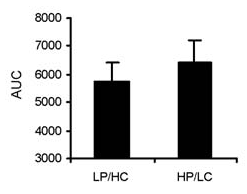
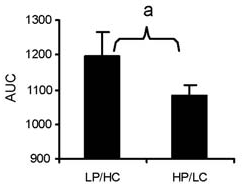

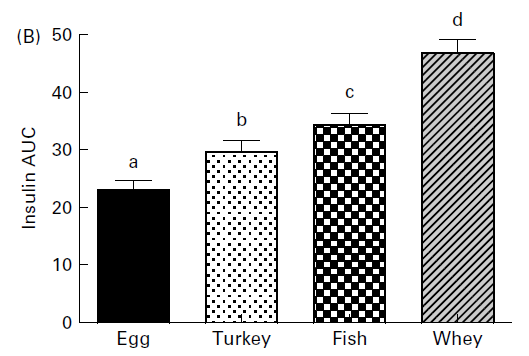
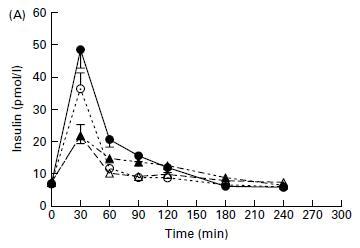
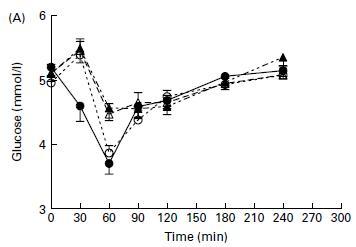
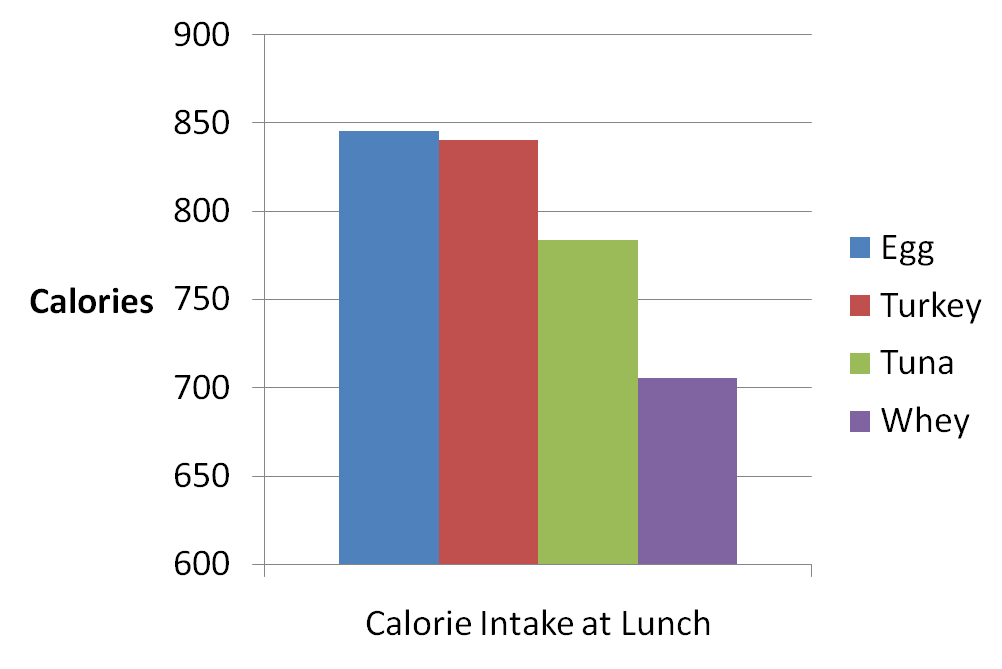
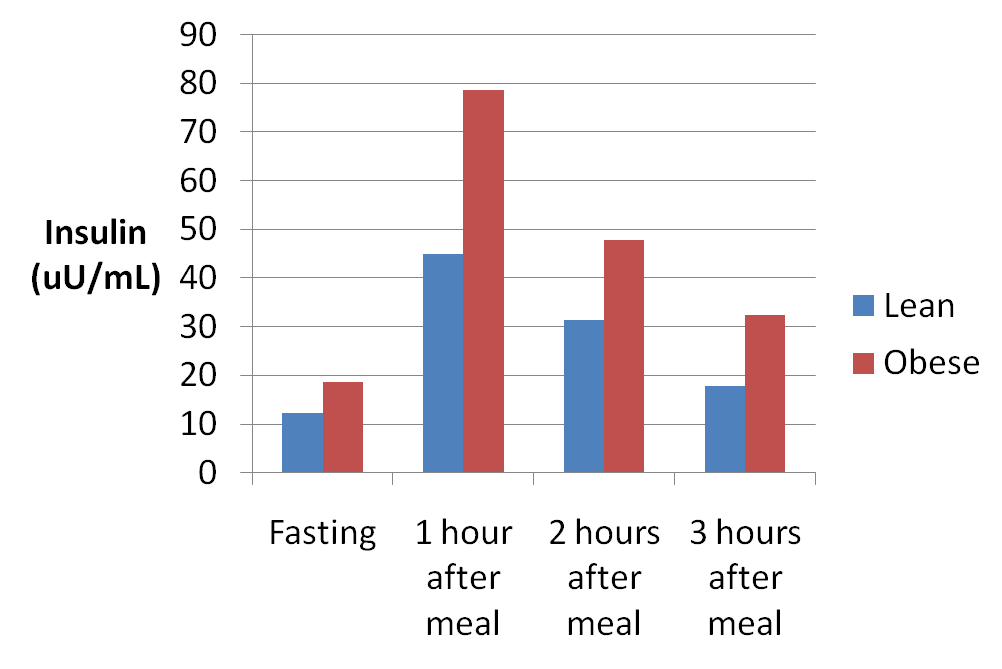
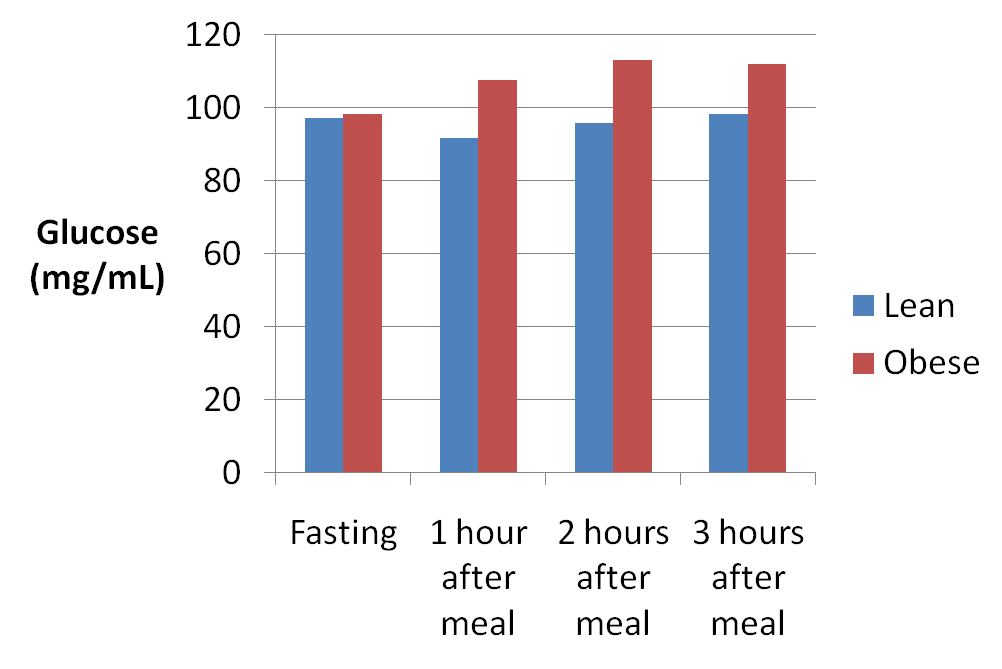
“you would eat a low protein, low carbohydrate, high fat diet. However, I don’t see anybody recommending that.”…. just wow… Now I know that you haven’t really read any of Taubes’ books. This is exactly the diet he recommends. In fact Taubes doesn’t necessarily tries to ban all carbohydrates from our diet (he recommends to eat plenty of vegetables where sugars are bound to fibre) but to include more natural occuring fat.
Extramedium,
Yes, I have read Taubes’s books. And Taubes says very little about protein in his books. Note that I said “low protein.” In fact, Taubes’s ignorance of the powerful impact of protein on appetite and lean mass retention is one of the major shortcomings of his books (among many shortcomings).
What will happen if you eat high GI carbs and dont use it as energy, but your muscles and liver sores are depleted, would it store it in your cells for further use?
Yes, it would be stored in those tissues as glycogen.
James, As a dedicated and passionate researcher in the field of natural health and nutrition, I find great appreciation in your article. Much respect to you. I do agree that the “bash insulin” game is unfounded in many ways and a commonly used crutch for many people to continue to overeat. Many people; however, have had great success with weight loss and general (and not so general) health on a high fat low carb diet. Let’s say I eat a meal moderate in protein, high in fat and low carb (50g or less) The protein would indeed induce an insulin… Read more »
Hi, David, Thanks for your comment. I disagree with your comment because it focuses solely on insulin and ignores all the other hormones and factors that affect fat metabolism. Also, there are some errors in your comment. For example, glucagon stores are not depleted; glucagon is a hormone. Perhaps you are referring to glycogen. Another reason I disagree with your comment is that it is focused purely on the postprandial period (the period shortly after a meal) and ignores what is happening over a 24-hour period. What really matters is 24-hour energy and fat balance. The primary mechanism behind how… Read more »
James, There is a lot of interesting and useful information in this article, but I can’t help feeling that something is missing. For most of my life I’ve been a big sugar eater, going through a litre or more of sugary drinks each day and consuming high amounts of bread, potatoes, rice, and sweet sugary foods. I’ve always maintained a slightly wobbly belly, though never got really fat. Earlier this year, as an experiment in order to try and lose that belly fat and get a look at the abs underneath, I went on a low-carb diet for 3 months,… Read more »
Dust,
Note that nowhere in my post did I claim that reducing carbohydrate intake does not help people with fat loss. There have been many cases where it has, but insulin is not the mechanism. People need to be very careful about assuming mechanisms for things that worked for them in what is a completely uncontrolled, unscientific environment.
Well, I think Dr. Lustig (among others) has found the missing link. The problem is HFCS (high fructose corn syrup), which was introduced in 1970s. This cra*p is found in almost any processed products found on the grocery store shelves because it’s a very cheap way making stuff tasty (i.e. making cardboard palatable). Virtually every cell in the body can use glucose for energy. In contrast, only liver cells break down fructose (this is similar to how alcohol is metabolized). What happens to fructose inside liver cells is complicated. One of the end products is triglyceride, a form of fat.… Read more »
John, Dr Lustig’s assessment of HFCS is completely off-base. He is wrong on so many things about fructose and HFCS, I don’t even know where to begin.
For a start, I suggest you read Alan Aragon’s critique of one of Dr. Lustig’s lectures on fructose.
Here is a scathing review of Lustig’s book, and all of the scientific inaccuracies it contains.
I never even considered the potential negative effects of insulin before reading a post 3 days ago. Medical News Today had an article about the connection between insulin use and obesity recently and i checked out a briefing about the link in “Cell Metabolism”. I think you may be a bit closed minded…I have seen the negative effects and there’s a lot of research supporting this.
I am not close minded, Ana. I am well read, and I consider ALL the available data, and consider where the weight of the evidence lies. I’ve seen the Cell Metabolism article as well. But the Cell Metabolism article does not refute the overwhelming data that indicates that insulin does not deserve the bad reputation it has received.
If there’s “a lot of research” supporting what you perceive to be “negative effects”, then please provide it, with references and details of the articles, as well as how this research represents the overall weight of the evidence regarding insulin.
Hello James, Ive been scouring the internet for articles like this and thank you for giving us the info. I had a question and was hoping you would help If a person were to be insulin resistant and find themselves in a state where insulin levels are high (and constantly so throughout the day), wouldnt that inhibit fat loss (not just weight loss; which as we know can come in many forms, ie: water, LBM)? Also, from some of the articles Ive read, Insulin can inhibit fat loss but it also plays a role in gaining lean body mass (muscle… Read more »
Ali, Thanks for your comment. Even in a state of insulin resistance with higher baseline insulin levels, it would still not inhibit fat loss if you are in an energy deficit. This is because the higher insulin are because of the insulin resistance; the insulin “signal” is still the same, it just takes more insulin to do the same thing in a state of insulin resistance. So there would be no net detriment to fat balance. In fact, some research shows that insulin resistance predicts *less* weight gain over time, not more. Where insulin resistance may become an issue is… Read more »
Am I the only one noticing that some “myths” are not actually myths, and that in some cases the “facts” do not even try to directly address the myths? “MYTH:A High Carbohydrate Diet Leads to Chronically High Insulin Levels”. Does anyone really believe this? I mean, aside from the fact that a HC junk diet WILL usually make you hungrier, leading to more frequent eating, leading to more time slices of elevated insulin. So either the myth here is a strawman, or it is severely misrepresented. “MYTH: Insulin Makes You Hungry”. Has this been the basis of any argument for… Read more »
I hadn’t noticed, but you’re right. The ‘Carbohydrate Drives Insulin, Which Drives Fat Storage’ “myth” isn’t refuted by the “fact” below it…
Actually it does refute it, because it is the low-carb camp that claims that insulin is the primary fat storage hormone, and all you need to do to lose fat is to keep insulin low. But this is refuted by the fact that the body can synthesize and store just as much fat when insulin is low as it can when it is high.
I’ll disagree: the body “can” synthesize and store just as much fat, but in reality it doesn’t given an excess LCHF diet as opposed to HCLF or SAD diet. When we try to lose or gain weight using these two diets, with the same amount of calories, the bodies response is different. Cals in/out thermodynamics may still apply but the bodies hormonal response and subsequent loss/gains, metabolic rate are different. So to get the body to synthesize protein to fat will be exponentially more difficult in reality. The reality is you can’t overeat protein like you can processed carbs.
John, if you can, read this study in full: https://www.ncbi.nlm.nih.gov/pmc/articles/PMC4962163/ You can get the full paper if you google “how to use sci-hub”
It is a metabolic ward study (very good for studying weightless since it doesn’t rely on self-reporting). Study participants lost weight on a high complex carb diet. Then switched to a high fat diet with the same amount of calories. They still lost weight but the weightloss slowed. This doesn’t support the keto hypothesis.
MYTH:A High Carbohydrate Diet Leads to Chronically High Insulin Levels”. Does anyone really believe this? Yes, there are plenty of people in the low-carb camp that believe this. aside from the fact that a HC junk diet WILL usually make you hungrier, leading to more frequent eating, leading to more time slices of elevated insulin Yes, but insulin is not the mechanism behind how junk diets will make you eat more. Rather, it is related to energy density as well as food/brain reward mechanisms. “MYTH: Insulin Makes You Hungry”. Has this been the basis of any argument for low-carb approaches?… Read more »
I agree Ultimax “MYTH: Carbohydrate Drives Insulin, Which Drives Fat Storage FACT: Your Body Can Synthesize and Store Fat Even When Insulin Is Low The fact does not address the myth in ANY way. Please think these posts through a bit more carefully.” The correct myth would be: Insulin is the only thing responsible for fat storage. (which is obviously not correct – as you say excess calorie intake) I am overweight and insulin resistant, the reason I am overweight is because when I eat carbs (ignoring simple vs complex) I have a much higher insulin response than non-insulin resistant… Read more »
the reason I am overweight is because when I eat carbs (ignoring simple vs complex) I have a much higher insulin response than non-insulin resistant people, this response sends the excess glucose in my blood to fat cells How do you know that this is happening? Have you been given labelled glucose so that you can track where the glucose is going? Your statement here is actually contradictory. Yes, if you are insulin resistant, you will have a higher insulin response to feeding than someone who is not. However, this will NOT drive “excess glucose into your fat cells.” If… Read more »
A famous Greek nutritionist claimed on a tv show that: ”Big meals are associated with hyperinsulinemia, which is associated with stimulation of appetite, so its better if big meals are avoided”
Based on what you ve written about appetite his claim is wrong, right?
Also whats your take on big meals in general?
Hi, Nick, Yes, his claim is wrong. Hyperinsulinemia is not associated with stimulation of appetite. In fact, his claims makes absolutely no sense at all. Big meals are not associated with appetite stimulation, and there is not a single controlled study to support this Greek nutritionists claim. I have no problem with big meals as long as total energy intake over a 24-hour period is well controlled. Some intermittent fasters like Martin Berkhan have big meals and stay remarkably lean. It is when you have big meals all of the time so that your total energy intake is high; that’s… Read more »
I’m no scientist but. . . looking a that top graph. If I lowered or eliminated the green peaks by reducing or eliminating carbs, I would lose more fat, and form little or no fat. So if Iwant to lose weight, I shoud reduce/eliminate carbs, no? I guess I’m missing something.
Insulin is not directly responsible for fat storage; If you eat an excess of calories, you will gain fat regardless of how you control blood sugar (and insulin). The important thing to note from this article is that it’s not just carbohydrates that stimulate the release of insulin– Protein does as well. It’s also worth noting that the green peaks are not what you should be focusing on– The blue sections are more important because this is when there is nothing inhibiting lipolysis, and your body can utilize beta-oxidation (Utilizing body fat for fuel) as it’s metabolic process. I used… Read more »
Your blue-green graph is incredibly wrong: 1. 33% to 50% of all insulin is used for basal needs. That’s a huge omission from your argument. The more carbs you eat, the more glycogen you store, the more sugar your liver relases. The release is constant. It never shuts off. Those of us who monitor basal insulin find our usage drops incredibly by eating low carb. Mine has fallen from 24u a day to 15u on zero carb eating. 2. Do you know anybody that only eats three meals a day? Watch any vegan video. They are constantly munching on bananas… Read more »
Your full of crap and if your consuming zero carbs that means your not eating fruit or vegetables which is highly unhealthy. You should be dead soon idiot..
“your not eating fruit or vegetables which is highly unhealthy” — because you know, throughout human evolution we’ve been shipping fruits and vegetables that are out of season halfway across the world. Nobody needs to eat fruit, it comes in the fall as a dietary signal to gain weight for winter. Vegetables have some vitamins that you don’t get from eating muscle tissue, but you certainly get enough if you are eating fat and organs. The idiot would be the person who thinks you die if you don’t eat fruits or vegetables. Do a bit of reading next time before… Read more »
Will,
Certainly, nobody needs to eat fruit. But the scientific data is overwhelming as to the positive benefits of whole fruit. And there is no scientific data at all to support the idea that fruit is somehow a “dietary signal for weight gain in the winter.”
Q. What do they give the pigs when they need to fatten them? A. Corn…
Q. And what’s that got to do with insulin? A. Nothing
I’m a type-1 diabetic for 37 years. I have no diabetic complications and run an A1C near 6. So you can assume I have done a pretty good job of maintaining my Blood Glucose (BG) and have a good grasp on the effect of food/insulin on one’s BG. Yes, the chart you referenced is a simplification of the insulin process (which is why the author calls it a “rough chart”), but it correctly conveys the point he’s making about lipogenesis and lipolysis in a clear visible manner. Often, when diabetics go on a careful diet, they also start monitoring their… Read more »
Thank you for your comment, Ken
“In fact, the insulin response was somewhat higher after the high protein meal, although this wasn’t statistically significant.”
—then it wasn’t “somewhat higher” The 95%CI likely contained “ZERO” and inverse values (opposite signs). Not statistically significant is akin to saying “no difference detected.” If you’re going to play the statistical significance “game” then play by the rules.
Of course the CI would contain zero and inverse values. Of course a lack of statistical significance is akin to saying “no difference detected.” I was simply making a factual comment that the raw mean value was somewhat higher; I did not intend to imply that this represents a true difference, which is why I stated that the difference was not statistically significant.
That comment is not true. Not having statistical significance does not akin to saying “no difference detected.” That is a fundamental misunderstanding of the concept. Statistical significance says how likely it is that the difference is a chance artifact that might come from chance distribution of values. It does not say whether or not a difference was detected, rather than that, it tells you how likely it is, that this is just happening by pure randomness. A 0.1 significance still “only” says that there is a 10% chance that things are chance. In psychology, we use everything below 0.05 for… Read more »
Just read this and as a T1 it’s difficult to get my head around this as I have looked insulin from a t1 perspective for a long time. I also think about insulin in one way of another about 10 times a day. if I consume 10g carbs I’d require 1 unit of humalog insulin. I’d require 1 unit for about 60g-80g protein to compensate for the comparatively slower blood glucose rise caused by the protein. But I’ve always looked at insulin being used as a tool to react to a rise in blood glucose. But this data seems to… Read more »
Hi, Greg,
A T1 does produce glucagon while eating protein. It’s just that the conversion of protein to glucose is a slower process than the absorption of carbs into the blood, which is why carbs will give a much more rapid rise in blood glucose.